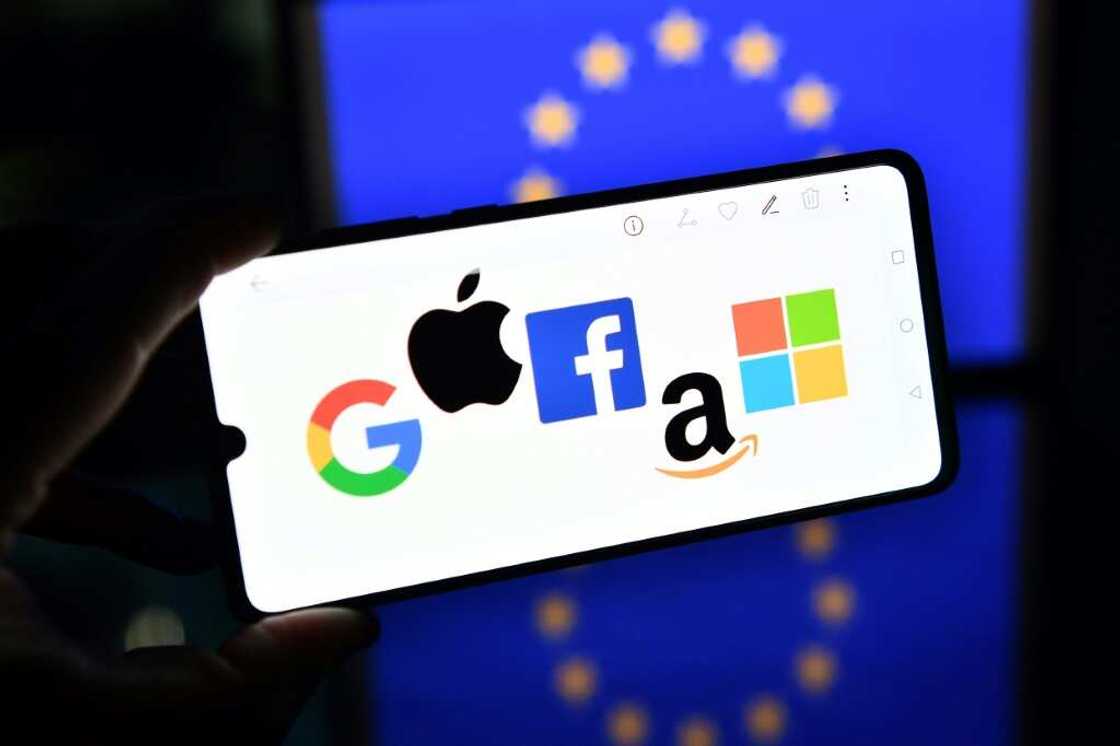Dominance, data, disinformation: Europe's fight with Big Tech

Source: AFP
PAY ATTENTION: Legit.ng Entertainment Awards 2024 Voting Is Alive. Choose the best entertainer in 15 categories for FREE.
The European Union warned Apple on Monday that its App Store is breaching its digital competition rules, placing the iPhone maker at risk of billions of dollars in fines.
It is the latest in a years-long battle between Brussels and giant tech firms, covering subjects from data privacy to disinformation.
Stifling competition
Brussels has doled out over 10 billion euros in fines to tech firms for abusing their dominant market positions.
The latest threat for Apple comes three months after the bloc hit the California firm with a 1.8-billion-euro ($1.9 billion) penalty for preventing European users from accessing information about cheaper music streaming services.
Among big tech firms, only Google has faced a bigger single antitrust fine -- more than four billion euros in 2018 for using its Android mobile operating system to promote its search engine.
PAY ATTENTION: Click “See First” under the “Following” tab to see Legit.ng News on your Facebook News Feed!
Google has also incurred billion-plus fines for abusing its power in the online shopping and advertising sectors.
The European Commission, the EU's executive, recommended last year that Google should sell parts of its business and could face a fine of up to 10 percent of its global revenue if it fails to comply.
Privacy
Ireland issues the stiffest fines on data privacy as the laws are enforced by local regulators and Dublin hosts the European offices of several big tech firms.
The Irish regulator handed TikTok a 345-million-euro penalty for mishandling children's data last September just months after it hit Meta with a record fine of 1.2 billion euros for illegally transferring personal data between Europe and the United States.
Luxembourg had previously held the record for data fines after it slapped Amazon with a 746-million-euro penalty in 2021.
Taxation
The EU has had little success in getting tech companies to pay more taxes in Europe, where they are accused of funnelling profits into low-tax economies like Ireland and Luxembourg.
In one of the most notorious cases, the European Commission in 2016 ordered Apple to pay Ireland more than a decade in back taxes -- 13 billion euros -- after ruling a sweetheart deal with the government was illegal.
But EU judges overturned the decision saying there was no evidence the company had broken the rules, a decision the commission has been trying to reverse ever since.
The commission is also fighting to reverse another court loss, after judges overruled its order for Amazon to repay 250 million euros in back taxes to Luxembourg.
Disinformation, hate speech
Web platforms have long faced accusations of failing to combat hate speech, disinformation and piracy.
The EU passed the Digital Services Act last year, which is designed to force companies to tackle these issues or face fines of up to six percent of their global turnover.
Already the bloc has begun to show how the DSA might be applied, opening probes on Facebook and Instagram for failing to tackle election-related disinformation.
The bloc has also warned Microsoft that the falsehoods generated by its AI search could fall foul of the DSA.
Paying for news –
Google and other online platforms have also been accused of making billions from news without sharing the revenue with those who gather it.
To tackle this, the EU created a form of copyright called "neighbouring rights" that allows print media to demand compensation for using their content.
France has been a test case for the rules and after initial resistance Google and Facebook both agreed to pay some French media for articles shown in web searches.
PAY ATTENTION: Stay Informed and follow us on Google News!
Source: AFP





